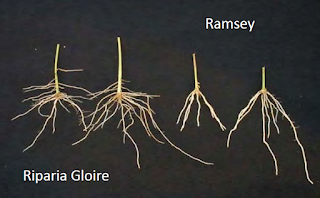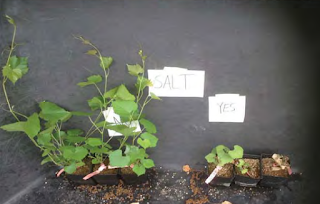Using and Breeding Drought Tolerant Grape RootstocksThe authors of the paper linked above wrote an article that is very easy to read and understand. They talk about the characteristics about a rootstock that make it drought resistant.
This is interesting to me because resistance to drought has not been seriously considered by breeders of apple and pear rootstocks.
Background
Grapes can be propagated by cutting a length of last year's growth. Typically, it will be about 12" long. It can be stuck in the ground in the spring and will start to strike roots when the soil gets over seventy degrees F.
While grapes CAN be propagated that way, most of them are now grafted onto rootstocks which still ARE propagated that way. That way the grower can combine the high-quality fruit of the above-ground variety with resistance to multiple types of stress.
Resistance to drought and to low-quality irrigation water is of particular interest to grape growers because they are often grown in arid areas and some places, like the EU, have limitations on irrigation*"
Deep roots
 |
The rootstock on the left is V. riparia x V berlandieri while the rootstock on the right is V. rupestris x V berlandieriLarge roots that plunge deeply into the soil are more efficient at extracting moisture stored in the subsoil than roots that are closer to the surface. Keypoint, grapes produce "perennial roots" that can last for decades and "annual roots" that are typically very thin that it sloughs off after a short period of time.If you compare the two varieties shown on the illustration above, you can see that 420 A (which is considered fairly drought tolerant) has very few roots below one meter of depth while 110 R (which has proven very drought resistant) has and even distribution of roots of all sizes through the entire depth that was examined. Presumably, 110 R has roots deeper than the 2 meters where they stopped digging.Yes, they dug trenches by hand and plotted out each root they encountered.  | | Freshly rooted cuttings of Riparia Gloire (intolerant of droughts) and Ramsey (drought tolerant) |
It looks like breeders will be able to evaluate root structure of new selections at a very young age by evaluating the shape and diameters of roots on newly rooted cuttings. That causes me some distress because the apple trees I planted had a root structure that fanned out horizontally. Some apple rootstocks that have a reputation for drought resistance (MM-111 comes to mind) have a mix of thin, thready roots on the top-half of the cutting and coarse, plunging roots near the bottom of the cutting. The downside of MM-111 is that it is not dwarfing and is not particularly precocious.
Poor water quality In most places, the main factor that limits the quality of irrigation water is salt. Plain, old, common sodium chloride. Salt builds up when the fields are not regularly "flushed" with enough irrigation water to leach out salt that accumulates from the salt dissolved in the irrigation water. Conversely, sometimes a region gets enough winter precipitation to perform that task...but it cannot be relied upon. An additional complication is that unless the water used to flush the salt out is removed, it merely carries the salt deeper within the soil where it can diffuse upward and become a problem later.  | | Screening for salt tolerance. No salt controls on left, salty water samples on right |
 | | Examples of salt tolerant selections. No salt control on left, same clones grown with salty water on right. (approximately 100 mM concentration) |
The genetics for drought and salt tolerance come from species that grow in dry areas. Of the rootstocks that are commercially available, St George and 140RU are considered pretty good for salt tolerance.
|







Several years back I traveled to Greece with my daughters. On our visit to the island of Santorini, I was intrigued to see the practice of weaving grape vines into basket-like 'Kouloura', which provided protection to the grapes being produced inside the basket, where they were protected from wind, volcanic sand and intense sunlight. Majority of moisture available to those grapevines was in the form of nocturnal mists, so I'm presuming that whatever variety they were, they were drought-resistant and salt tolerant.
ReplyDeleteFrom some reading years ago, I believe there has been quite a lot of work on various rootstocks for grapevines. At least part of this was driven by the Phylloxera outbreak in the late 19th century in Europe, created when a European botanist brought back North America vinifera. North American rootstock had developed countermeasures; European rootstock had not. It caused great destruction in European vineyards to the point that some locations could no longer grow grapes.
ReplyDeletehttps://en.wikipedia.org/wiki/Phylloxera
(Interestingly to Lucky's post above, the rootstock of Santorini is one that has survived. The more you know.)
You had asked about Covid vaccines and cancer deaths. There are data and discussion here.
ReplyDeletehttps://theethicalskeptic.com/2025/06/20/the-state-of-things-pandemic/
Our culture here and in Europe used to have roots that were tolerant to cultural droughts in the cultural, financial and political sectors. Now that our strong healthy rootstock has atrophied and the social Pylloxera has come in through our open borders our cultures are shriveling up and dying. Can we revitalize our gardens and become fruitful again? I have my doubts. ---ken
ReplyDeletePockets. We only need pockets that thrive and they can be the Genesis Bomb that reseeds.
DeleteI live in Washington on the Puget Sound. There is a small pear (maybe apple*) tree that grows right on the edge of the salt water. It has small stunted round fruit. If you give me directions I can send you something.
ReplyDelete*It's fruit is small, hard, round and light green. Too hard to bite.
Thank-you, sir.
DeleteThat is a very gracious offer. As much as I wish I could take you up on the offer, I have a full plate.
It does sound fascinating, though.